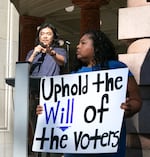Portland City Council members will consider next week whether to place three separate measures on a November ballot. Each of the proposals, discussed Tuesday at a work session, would alter voter-approved changes to the city’s form of government.
The whirlwind plan, led by city commissioners Rene Gonzalez and Dan Ryan, comes months after the city began laying the groundwork for these changes to the city charter, which passed with nearly 60% of the vote. Both commissioners say they believe the changes are either too confusing, costly, or impractical to carry out — which is why they want to run them by Portland voters again.

(Left to right) Portland City Commissioners Mingus Mapps, Carmen Rubio, Rene Gonzalez, and Dan Ryan at a public work session on July 18, 2023. The public is allowed into these work sessions, but not allowed to make open commentary.
Caden Perry / OPB
“We at least want to take a pause, reevaluate what voters approved and whether there’s anything we would submit to voters for clarification on their intent,” Gonzalez said at a Tuesday council session centered on the issue.
Yet it’s not clear if the proposal has the kind of buy-in required to move forward. On Tuesday, the idea drew pushback from city staff, elections experts and fellow city council members.
“At the end of the day, the question for me is, ‘Do we trust the will of the voters or don’t we?’” Mayor Ted Wheeler asked during the morning council session. “And even though I don’t uniformly like the outcome of the last election, it was the clearly stated will of the voters. This is not the opportunity for elected officials to tell the public how we think they should be governed.”
The original amendments to the city charter were approved with the passage of Measure 26-228 last November. The plan, proposed by the council-appointed charter review commission, expands the City Council to 12 members and instructs the city to divide Portland into four political districts. Under the new structure, voters will elect three council members to represent each district. These elections will come with a new voting system, called ranked choice, which allows district residents to rank their top three candidates on a ballot. Under this system, commissioners only need about 25% of district votes to win.
Both the mayor and auditor will be elected citywide under these changes. The mayor will no longer serve as a member of the city council, and will only intervene in council work to cast tie-breaking votes when needed. The city will also hire a city administrator to manage city bureaus, which are currently run by city commissioners.
Gonzalez and Ryan first floated their alterations to this plan last week but offered a more detailed breakdown of the proposal Tuesday. They want voters to consider three changes to what was passed in Measure 26-228: Whether the mayor should have veto power over any policy passed by the city council, whether the city council should only be composed of 8 members, and whether the city should adopt a slightly different version of ranked choice voting.
Veto power
Ryan said he is “most attached” to the idea of granting the mayor veto power. On Tuesday, he explained that it’s not fair to limit a city leader elected citywide from being able to overrule plans proposed by a city council where members are only elected by 25% of their district’s voters.
“To me, that makes no sense,” Ryan said.
Commissioners invited members of the volunteer commission that crafted Measure 26-228 to the council session Tuesday, pressing them to defend the ballot measure. Candace Avalos, a charter review commission member, said the group ultimately decided against including a mayoral veto after hearing strong opposition from Portlanders during public hearings.
“There were concerns about the mayor having too much power,” Avalos said. “They did not feel that would serve Portlanders well.”
Wheeler added that, while he supports having veto power, the role of the mayor should be advocating for smart policies — not simply rejecting disagreeable ones.
“The primary power of the mayor is not after the fact… after a policy has already been adopted,” he said. “The mayor has the power of persuasion and collaboration and [can work ] with commissioners and the community so that bad policies never see the light of day. I just don’t want us to assume that veto power is somehow a magic bullet.”
Council size
The cost estimations that come with expanding the city council have left some commissioners with sticker shock. Initially, city staff estimated the entire government transition would cost about $5 million annually for the first three years. Yet city budget officials now say that number will need to grow to account for construction costs. City Hall will need renovations to make space for new offices for the expanded council members and to increase the size of council chambers.
City Budget Director Tim Grewe reminded commissioners that the estimated $7 million in renovation costs was already accounted for in the budget, which the council approved last month. The plan is to recoup those expenses over the next 10 to 15 years using city dollars reserved for facility maintenance, Grewe said.
Gonzalez still argued that, by shrinking the number of elected officials by four, the city could save money. He pointed to the estimated $4 million needed to operate the publicly-funded campaign finance program for all candidates, and the expected salary hikes coming to all Portland elected officials.

Commissioner Mingus Mapps glances around the Portland City Hall chambers during a public work session on city charter reform on July 18, 2023. Portland remains the only major U.S. city to operate on a commission form of government. City Council members are all given city bureau assignments from the mayor, currently Ted Wheeler.
Caden Perry / OPB
Gonzalez also suggested that the council might attract lower-quality candidates with so many seats. Commissioner Mingus Mapps, who also was a vocal critic of the government overhaul package and announced he is running for mayor in 2024, challenged Gonzalez’s concern about candidate quality.
“Portland is a big town full of lots of really creative and smart people,” Mapps said. “We can probably find 12, I’m fairly confident of that.”
Style of Voting
The ranked choice voting method coming to Portland isn’t used by any other major U.S. city — a factor that’s driven Gonzalez and others to question the wisdom of adopting an untested policy. While other cities have adopted a process of ranking candidates to elect to a single seat, Portland’s version will allow voters to rank three candidates out of a single pool of candidates to represent a political district.
Gonzalez and other critics say this system could lead to voter confusion.
City Elections Officer Louise Hansen, however, said it would likely be more confusing for the city to introduce new ballot measures this late in the process. Having to wait until a November election to begin educating voters on the new voting system — which needs to be operational by November 2024 — could undermine trust.
“Training of staff, candidates and voters directly, the engagement of key stakeholders, and the production of educational material are all delayed with the uncertainty created here,” Hansen said.
Hansen’s concerns were echoed by Mike Alfoni, executive director of Ranked Choice Voting Oregon, who Gonzalez invited to speak Tuesday. Alfoni urged the city to follow through on the voting model approved by voters last year.
“While possibly well-intentioned, I don’t think any further changes to the form of structure of our elections is going to do anything but cause more discomfort amongst voters and chaos with the election systems itself,” Alfoni said. “To go back and forth before voters, that makes us look like a clown car. It’s not going to build trust.”
Next steps
Despite critiques, Gonzalez intends to introduce the three ballot measures to Portland City Council for a vote next week.
If three commissioners approve each standalone proposal, it will require the city’s elections staff to plan to hold a special election in early November. According to Hansen, it will cost the city over $600,000 to orchestrate this unexpected election.
It’s unknown whether Gonzalez and Ryan have a third vote to advance all three measures.

Robin Ye, left, and Candace Avalos take the stage at Portland City Hall to protest City Council's proposal to overhaul voter-approved changes to charter reform on July 18, 2023. Ye was a part of the Charter Review Commission tasked with suggesting changes to the city charter.
Caden Perry / OPB
While members of the public who opposed Measure 26-228 have cheered the commissioners’ plan, those who supported Measure 26-228 are frustrated that city politicians are interfering with the voter-approved plan.
Before Tuesday’s council session, more than 50 Portlanders met outside City Hall to protest the work session and the concept of revisiting the government overhaul plan once again. Melanie Billings-Yun, another former member of the charter commission that drafted Measure 26-228, told the crowd she felt responsible for the measure’s promises to be carried out.
“We implore city council to respect the will of the people, not derail a transition that is already underway and not trample on the hopes of those thousands of Portlanders who we promised would have a government to fairly and transparently represent them,” Billings-Yun said. “We stand here today to urge City Council to preserve that nascent public trust by rejecting this shameful proposal.”
Correction: An earlier version of this story misstated the estimated cost of shifting the form of government in Portland. City staff estimated the entire government transition will cost about $5 million annually for the first three years. OPB regrets the error.

A protestor holds a sign above their head accusing Commissioner Dan Ryan of dishonesty at a rally in front of City Hall on July 18, 2023. Commissioners Dan Ryan and Rene Gonzalez are the two City Council members who recently proposed a rewrite ballot measure to voter-approved changes to city charter reform.
Caden Perry / OPB
